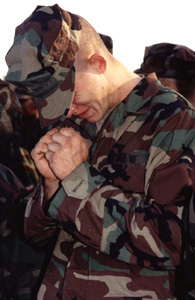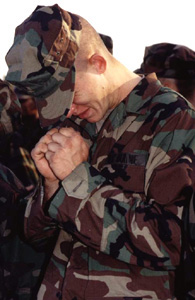Coming out to the military is an issue all gay Singaporean men grapple with one time or other as all male Singaporeans must complete two to three years of full-time National Service. A young Singaporean man shares. This is the final instalment of a 3-part series.
Click here to read Part One and/or Part Two.

My National Service Assignment
I was not posted back to Officer Cadet School because of my disclosure of homosexuality. I was given a PES of C1, L3. This means that I may be excused to up to two static stations in the physical fitness test, e.g. pull-ups and sit-ups, and that I may be fit "for operational duties at bases only."
This result is a statement of what the SAF believes I am capable of. What this tells me is that the mere fact of being gay means that I cannot take up a front-line combat vocation and cannot be trained to be an officer in the SAF.
I hope my experience is helpful to those who want to know how gay men who disclose being gay are processed in the SAF. Remember, disclosure is a choice. There are many gay and bisexual men who have completed their NS without disclosure with little problem. If however you wish to disclose your sexuality, I hope my experience helps you be fully informed.
This report is a work in progress. Correction and critique are very welcome. If you wish to add your experiences to this report, please email me at limchisharn@m... . Complete confidentiality will be respected and maintained instantly upon request. Future generations of gay NS men, their parents and friends may benefit from your contribution.
The SAF Interview: A Mother's Reflection
Like any mother, I was concerned about what might happen to my son when the SAF finds out that he is gay. My son has chosen not to live his life in the closet, and I, who taught him that truth is superior to falsehood, cannot but support his decision to disclose himself to the SAF. The NS enlistment form had a question that asked: Are you a homosexual?
The SAF requested that a parent be present at the interview. So I went to the interview with my son with my list of prepared questions. We waited for the doctor. When he finally arrived, he was friendly, a little guarded and professional. I thought he answered our questions as best as he could, and did not withhold information unnecessarily. His approach was: if you ask it, I will answer it. The other side of the same coin is that if you don't, you will never be told voluntarily. Therefore, one thing I have learnt from this interview (my first with an army officer) is to ask questions to get the information you require. If you think you might feel awkward or tongue-tied, it is best to prepare a list of questions beforehand.
Sharn and I thought that since we were going to be interviewed anyway, we might as well use the opportunity to find out as much as we could first hand about the SAF's policy (overt and covert) towards gay men in NS. Since you can read Sharn's report on the outcome of the interview, I will share with you my reflection on it.

Q1: Why am I here? What is the purpose of parental presence?
I gathered from Dr Tan's answer that a parent was required to verify his/her son's gender status and sexual preference. A parent's presence can reveal several things about the gay NS man such as (a) whether he has come out to his family, (b) whether his family accepts his sexual identity, and (c) other things that a trained counsellor / psychologist might observe during an interview with a client. I did sense that the doctor was observing how Sharn and I communicated with each other.
Q2: Will this information appear on any record, document, written or otherwise?
I felt somewhat reassured that there is some respect for privacy and confidentiality between doctor and client. (I refuse to use the term, 'patient' vis-�-vis the doctor since in this case, the gay man is not suffering from any illness.) I was further reassured when the doctor said that one's records could be changed in the future, and the procedure seemed pretty straightforward.
Q3: What will happen to my son? Will he experience discrimination? Will he be blacklisted as a security risk, a liability or a deviant?
The doctor tried to reassure us that there would be no discrimination although he qualified it by saying that there would be certain sensitive areas. What these were, he did not clarify and I did not want to press him for more details. As a mother, my first objective was to find out and also to send a message to the doctor that I was standing beside my son and the army would have to deal with me as well as him. For a mother, her son comes first before any armed institution in the world. For a writer, the person is always more important than the system. Literature celebrates the person; propaganda lauds the system.
Q4: Is My son considered/ perceived to be mentally ill by the SAF?
I wasn't and still am not clear how the SAF perceives gay men in this respect. My impression is that the organisation or the doctors have adopted a case-by-case approach. How the NS man is going to be treated would depend on a number of variables such as (a) his academic / school record (b) medical history (c) academic performance/ achievement (d) level of education (e) even how well he spoke and other personal traits (e) level of parental support (f) educational & income level of his family. This is speculation on my part and I could be wrong. My impression is that my son would be fairly treated even if he could not be posted to Officer Cadet School because his school records and academic performance are beyond reproach; and the doctor could see for himself that I was comfortable about his gender status (male) and sexual orientation (gay).
Writer's note: Please feel free to share my experience with anyone to whom it may be helpful. Please remember to reference my name, as this work and the views presented are mine. If you wish to place this information on a website or other broadcast media, please contact me at limchisharn@members.asce.org.
